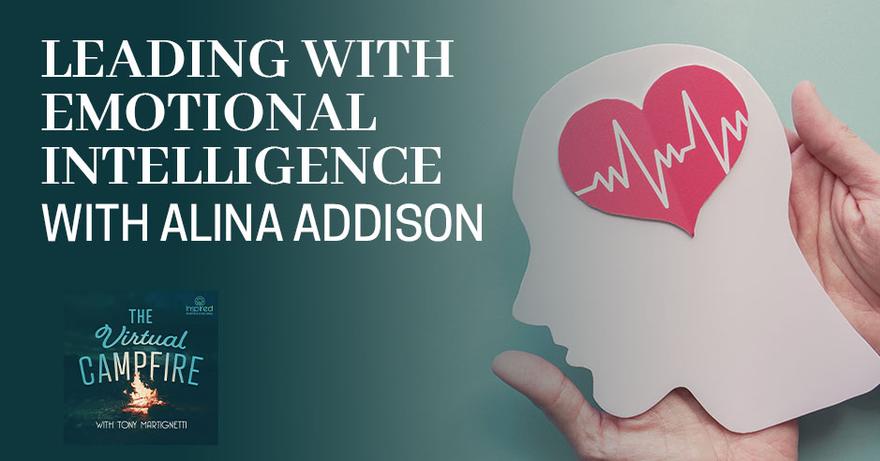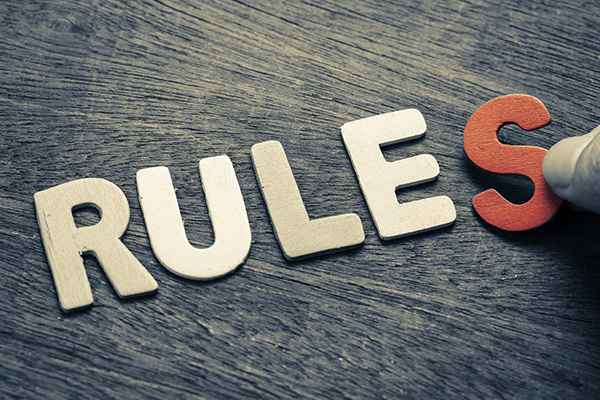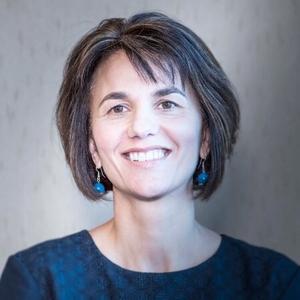Leading With Emotional Intelligence With Alina Addison

The skill that differentiates a leader from a boss is emotional intelligence. A lot of people think that EQ is a soft skill but Alina Addison believes that it is a critical skill. Alina is the founder and executive coach of ADAPTAA. Tony Martignetti brings Alina in to talk about her journey to become a coach. Learn why Alina shifted to emotional intelligence coaching from bank accounting. Learn why her coach and son had such a huge impact on this shift. Also, learn how she is empowering the women around her, thanks to her only women community. Learn all this and more in today's episode.
---
Listen to the podcast here:
Leading With Emotional Intelligence With Alina Addison
It is my honor to introduce you to my guest, Alina Addison. She is an accredited executive and team coach with twenty plus years of frontline business and leadership experience. She's qualified as a chartered accountant with PWC and is an ex-investment banker with Rothschild. She coaches leaders and aspiring leaders, mainly in financial services, banking, and venture capital firms.
Her clients describe her coaching style as challenging, energizing, inspiring, and unflinchingly honest. Her approach is to encourage and support her clients to adapt to change by developing practical solutions in reinforcing the best in them. Alina's first book is due out in early 2022, and it's titled the Audacity Spectrum. In her spare time, she's a board advisor and fundraiser for chosen children's charities. Humanitas, Autistica, and Hospices of Hope, as well as remotely managing a small hotel she built in Transylvania in 2004. She lives in London with her two children and two fluffy dogs. I want to welcome you to the show, Alina.
Thank you so much, Tony. It's such a pleasure to be here with you.
I love the fact that we get a chance to introduce such an amazing individual to the audience here, and I'm dying to find out more about your story of what brought you to doing all this amazing stuff in the world. I love that you are so involved in charities and the fact that you have built a hotel in Transylvania is a little unusual for the most people reading, but I love to come one of these days and check it out.
You're on my guest list. We'll be there doing one of our coaching retreats.
For your sake and for the audiences’ sake, I want to make sure that they understand what we do here in this show. We talk about your story through what's called flashpoints. These are points in your story that have ignited your gifts into the world. As you're sharing your story, I want you to pause along the way and we'll see what's coming up. Take your time and share what you're called to share, and I'm looking forward to see what brought you to this place where you're making such great impact in the world.

Flashpoints for me, I suppose, as you already said already in your wonderful introduction and thank you for that. This is probably what most people know about me is that I have started as accountant. I grew up in Bucharest, so that's my link to Transylvania, and then I went to university there. I came and did a second degree here in the UK, and I kept going on academically with this Accountancy, in my madness as if I didn't have enough exams and then I became an investment banker. I qualified as an accountant, only did it for a year. I became an investment banker with Rothschild and I was there for quite a long time. I became the head of training and head of execution and I conventional success.
I achieved a high degree of that conventional success. I was made an MD. Early on, I was fast tracked and I am told I was the only person at Rothschild who was made a managing director whilst I was working four days a week. In that time, I also build this hotel in Transylvania. As you do as an investment banker, you get bonuses every year.
That was my very first one when I decided that I will invest back into my homeland and it took almost four years to build the hotel. It's 2001 to 2004 when my first child was born and we celebrated more or less those two together. That's probably what most people know, I made that transition to coaching a few years ago.
It was more than five years ago when I set up my company called Adaptaa which is all to do with ability, and I can tell you that story maybe another time. Most people know that I work with leaders and aspiring leaders. I teach them this one critical skill. The skill that differentiates a leader from a boss, and it differentiates a struggling parent from a parent who enjoys a satisfying family life, and that one critical skill is the emotional intelligence. It's the one skill that most people call soft, but it's probably one of the hardest skills to acquire. What most people don't know about me is why I feel so passionate about this. My son, when he was ten, he was diagnosed with high functioning autism.
That was several years ago. What most people may not know is that is an example of a very low emotion intelligence in my opinion and from my research and what I found. At that point when I decided I do a lot of research and I went on this quest almost to learn as much as I could about what autism was, but also about psychology, neuroscience and later on this EQ, the emotion intelligence. He's been my greatest testimony. A lot can be achieved and which is why I feel so passionate about it, because I always say if someone learned like my son done, arguably with low self-control, which is one of the key muscles with low adaptability, if he can improve it, then anybody can. That's why I'm here.
The skill that differentiates a leader from a boss is emotional intelligence.
I want to unwind a bit more and maybe even go further back into your story, because what you shared is so powerful. It's interesting. This coming from the accounting world, coming from the finance world, because you didn't just stay in the accounting world, you went into investment banking and beyond and then switching gears, but you had a real reason to move into this world of understanding the EQ space.
One of the things I wanted to understand is like your childhood, when you thought about who you were going to be when you grew up. What were the things that you imagined for yourself? What were the things that you had seen growing up as a little girl in Romania? What were the things that came to mind?
I have very fond memories of Romania. Maybe people who are reading to this and know that part of the world, because he was a communist. Not many people have got dark memories and I do, but I had a wonderful loving family. I have a sister back home and I loved growing up as a child. Academically, I suppose it was easier for me because I sailed through school. I quite loved school. I loved books. That was one of my passions. I used to read almost a book every day. My dad who's used to come and say, "Alina, just switch on the light."
I would, and then I would still have my torch under the covers to read the book and I will start with the end. I want to set this end in mind. I used to love to see what's the end of the story. The beginning and the end, and I would go in the middle, but I know I had no idea. One of the things that I know I love the idea of traveling, which wasn't possible in those times, because it was the iron curtain.
You would work close. We could only do the Eastern Bloc. I only tumbled. The first time I traveled, I was late into twenty, which was UK, where I ended up coming to study. One of the things I do remember is I used to dream with my eyes open, and what I know about that is the power of manifestation and visualization.
I still used to dream about this place with lots of water, and where I ended up in London, which is an island. Also, we've got the river time. It is interesting now that what I know now looking back to those days. I qualified as a teacher only enough. Now that you take me so many years back, because in Romania, you didn't have to go to university.
You had to do to this proper special school, a primary teacher. At the age of eighteen, I was a qualified primary teacher, and I did Psychology as part of teaching children. I remember loving that particular subject, but then I went onto do Business and International Relations and Economics. I went into the finance world and I forgot about the teaching world, but as they say, we go back to the roots.
That's exactly what I love when I hear what people say about their early days is that there's always some connection back to the early days. That was so amazing to hear that. You come to London, you get into the technical side of business, because when you think about business and some people choose marketing.
Some people choose the left-brain part of the business. Right-brain, I get confused, but more creative side of the business. There's accounting, which is more like follow the rules and then you do that. Now you're in this world where you not do that. You think more about how to be more creative. How to connect to emotions, and you've come 360. Interesting.

I always say we play. I know you know bit more about me rather than the audience, but in Adaptaa I've got my partners I touch on and Carmen, and we always joke that I'm the rule maker, in some other time as a rule breaker. We're trying to sort the roles, but it's true. Coming from that very structured world. That's how I started.
One of my things I always talk about is how structure creates freedom. When you have those rules, it's great to have them because it creates boundaries for you to be able to play with. It's important to have rules. I also want to ask, as you had that discovery that your son was on the spectrum as they call it, what was the emotional state that you went through? It's not an easy thing to deal with. How did you react?
I can't even remember, but I do remember so many mixed feelings. One was relief because it's good, too. I know we can debate labeling versus non labeling. Shock, a sense of powerlessness as well, because when I remember about those days, I always say, "I was the head of trading and execution." I could negotiate with almost anybody, truly in that sense. The one person I could not negotiate with was my own son. I thought when I had an answer to that, it was such a sense of relief. That's the reason why I called my book, the Audacity Spectrum because I got so fond of the word audacity.
Watching my son in action. He's got this incredible ability to push boundaries. This incredible ability not to hear no and see perspectives that are just so hidden to many people that I have come to appreciate the power of that, interestingly, over the years. At the time, it stretched me and challenged me, but he certainly has been my absolute greatest teacher and my most wonderful student. That's the truth.
This is so beautiful, the way you painted a picture that oftentimes when people have that realization that now they've got some answers, it can be such a relief. Even though there's still a long road ahead to figure out how to deal with it, at least now you have something to hold on to. For you as someone who likes rules and likes control, let's call it. Even now it gives you a sense of what can you do next? What's the next step that you can take? Hearing that is powerful.
Yes, thank you. It's interesting. Once you have narrative and language to explain, it does make everything easier. I remember reading the book The Chimp Paradox before we diagnosed them. It gave me a language without even knowing about the chimp and we used to play. Who is it? Who's talking now? Is it you or is it the chimp?
Having some sync to put it into words, and then I came to understand the different wiring and there is a way to get to that type of wiring and dancing. Me understanding. It's truly talking about adaptability. One of the things is that it's very quite inherent in that particular difference because now I don't even call it a condition.
It's just different. It's flexibility. With my clients, when we work on adaptability, I always say, "Where do you need to be more flexible in your life?" The way I learned it probably a lot more flexible now than I was certainly several years ago. It's playing that game. Who's flexible right now? Who's more flexible right now? Sometimes done with hands down. We learned it together, which is quite a journey.
Tell me more about as you started to get into this world of wanting to explore EQ, what was the transition point? You stayed in that world of investment banking for a bit of a while, even after your son was diagnosed and you had a clearer picture of where he was. What happened next? How did you make the transition and say, “I'm going to go into coaching?”
I wish it was so simple. That's it.
It’s never simple.
Once you have a narrative and the language to explain. It makes everything easier.
I had a wonderful coach. I always say John was the inspiration for me to make this transition. I suppose for me John was always just the transformation. I had, through all of those years, having been made an MD, everything that we do, we do through people. It was a serendipitous conversation with someone and they said, "Do you know John?" I said, "No, should I?"
Literally, I had this wonderful encounter and John has a similar story to mine and he became my coach. It was truly amazing to watch him in action because I always say when people wanted to make a transition, that you just have to look around for role models, who is out there, who is doing what you want to do.
It was totally subconscious for me. It wasn't a conscious decision. It took many years in that sense. I went through many leadership courses as a leader and I remember sometimes being in a classroom and thinking, "How cool? I would love to be at the front of that classroom," but it seemed impossible. Truly, it seemed, but now looking back, because I had a very good job.
I had no reason to switch, but there were quite a few of those events. At one point, I thought, "I should maybe try." We used to joke when I used to be an investment banker and I saw people in my team. They went on maybe to do different things, grander things and they used to say, "When are you going to just go and set up your women-only hedge fund?"
That was a joke, even in our team. I thought, "That sounds quite cool," but the idea of things sticking with the financial services, it just didn't appeal to me as much when I was thinking, "What do I want to do with the next twenty years of my life?" When I made the leap, I even remember saying to my coach and he was terrified, but a coach wouldn't say that.
The coach just looks at your high potential, and he said, "That's interesting." I'm sure it would be. We had that discussion because now looking back is everybody. It's not easy to make it in the coaching world as you and I know. It's busy, overly saturated, and it's not just about having amazing coaching skills. You have to have a lot of other skills that come with it.
For me, having that role model and then having a plan, now I can talk about it looking back. For me, it's like, "If this doesn't work within two years, then, although I never want to have a plan B, I will say it's a plan A, but I could always reconsider." That's how it started quite audaciously saying, "I had in the front. I'm going to try to do this and then see what comes out of it." Somehow with universities, I ended up not having an all-women hedge fund, but still having a wonderful community and having a team of women right now, although we are collaborating with a lot more, but yes.
A couple of things for clarity. MD means Managing Director for those who don't know.
Sometimes you realize that when you been for so long and you assume that everybody knows what you mean. It means Managing Director, which is quite high status.
You mentioned John earlier. John was who, again?
John is my coach. John Smith. Every John in the UK. He's a wonderful coach. If he ever will read this, he’s the inspiration for what I'm doing. There's no doubt.

We'll have to share it with him now. The challenge is on. There's something about this when you put an intention out there, and even though you may not have created that hedge fund for women only, there's this element of you didn't reach that, but your ability to create a business that has all women in this business that is creating great impact. It's still a pretty amazing thing that you've created, and it might inspire that next person to go out and create that hedge fund that is going to make that impact. Now that we've put that intention out there, someone else could pick up on that and make that happen.
It is. Talking about the manifestation, but the inside of the hedge when you said that. There's a coach. One of the things that I do is group coaching, and one of the programs that we created before the pandemic started is what we call the Inspiring Women, which are all women in the financial services. We're now at the eighth group because it's quarterly. I can already see some of those women who have graduated from that coaching program going and setting up hedge funds.
I often think about this whole ripple effect, and that's like when you start to create something that is powerful and you start to put all the things that you create into the world with the intention that other people will pick up from your inspiration, thoughts, intention, and audacity. That ripples into them, and they find ways to take that and run with it. That's impact. That's ripple effect. That is what we're all about. That's important and it's something we should be striving for as coaches, as human beings in general.
Now just listening to you and to our wonderful conversation is maybe I should have set that as an intention to have a look as to, which one of those clients could set up the women-only hedge fund, which is quite a possibility. It's a bigger possibility now than I thought.
I want to ask some questions around, as you think about that you've come and built this business which is doing great impact in the world, when you look back to your path to getting here, what are some things that you've learned about yourself that you haven't already mentioned that you want to share? Maybe some lessons you've learned along the way that you want to share with people.
Many. I'm always very aware. I acknowledge that what works for one doesn't always work for the rest. Us as coaches, we do a lot of that self-discovery and we have certain preferences. I am an extrovert. I love people, but a lot of people in my community are introverts, so they take the energy from inside while I take it from the outside.
I always said, "I am a planner," and I used to joke with that. However, I had to learn to let go of that planning. Certainly, if nothing else, that's one of the things that I've found the hardest. Having had a plan and it's what worked for me, but I have now learned in the last few years to let go. What I play with all of my clients is I always say, "It's great to have a destination." Let's play with that idea and then let go of how we're going to get there.
It's a week because we could get there by plane or by boat, or who knows. There are many other ways. For me, that's probably one of the biggest learnings that sometimes I am relearning to be playful, because I lost all of that ability, skill, whichever you want to call it throughout that period of extreme structure. I'm enjoying rediscovery, the creative. I was convinced. I used to say, "I'm totally uncreative." I don't even know what that means.
Our narrative is so powerful, "What we say is what we become.” I became someone who was not creative in any way. I was a rule maker and that's so not true because the truth is it's not absolute. Sometimes it's great to go with the flow. It's good to have the structure but that was probably one of the things that I've learned most and the community. The allyship. Surround yourself with people that you admire and that scare you a little as you I know. The community, but it's so true because I'm sure you know and most people know all of that saying of, "We become the average of the five people we spend most time with."
Sometimes for leaders, I always say, "Surround yourself with people who you might think they’re better, but the leverage effect of that community is extraordinary.” Role modeling, have a look around who is doing what you want to do and never be afraid to ask. That's what I did audaciously, probably to an extreme, but sometimes annoy my friends or my family when, if I don't know it and we're somewhere and I go and ask.
I find the first person then say, "Which is the way to New York?" They say, "We've got a map," and I said, "Why bother?" There's someone who would tell you immediately. They'll tell you to go right or go left. For me, don't be afraid to ask. Most people would probably appreciate more being asked than not being asked, and ending up delivering something that you thought they wanted, but it wasn't what they wanted.
Everything that we do, we do through people.
These lessons you've learned, I can imagine that a lot of the people you'll work with, they struggle with the same things and they probably need to hear exactly this. Would you agree?
I do and one of the things with my high-powered clients as I called them, is this fear of not knowing. They are in a very high position and they go in my world is the investment committee and the fear that they don't possibly have the answer. We can't have the answer to everything, but it's having that courage to say, "I don't know the answer to this, but I should find out." It feels audacious, but it also feels liberating. When the client's like, "I have this choice of saying, I don't know." We do.
It's not weak. It comes from a place of strength, too. Speaking of audacity, maybe you want to share a little bit about what it is about the book that you wanted to give a little snippet of what it's about.
Audacity is a word that I felt quite attached to it, although we should never attach to it, is through my experience with my son. I always say audacity is almost the one level above confidence because the audacity has got this negative connotation to it historically, you look into the dictionary. It's the daring and the caring. That's the two dimensions of audacity in my world, but also not caring, because most people care so much about what other people think and that paralyzes them. Finding that balance between we need to care because when we care about something and I've seen that with my son, nothing stops him, but if he doesn't care, it's like he gets bored easily and that's it.
You could try whatever you want to try and it would be quite difficult to move him. That applies on a scale of 1 to 10, he feels everything 10 times more intensely, but any neurotypical person, as I call them, will have the same challenges. How much do we care is my question. How much do we then dare to pursue whatever it is that we want to pursue in life?
Most people sometimes don't even know what that is. Take some questions taking you back to the childhood as you took me to find out what was it in there that we might have put into a box and never looked at it. The spectrum for me is obviously that link with the autism spectrum because it's so wide. Every person, child, and adult with autism, it is one person.
You've seen a million of them and you've seen million different variations. When I talk about what that is, I always explain to people it's a cocktail and you don't know, we don't yet have the science. You could put a lot of little labels. OCD, ACD, ADHD and all you need is a little bit of everything or one that becomes a little bit more amplified because of the environment.
An environment is critical for all of us, but especially for people on the spectrum. It's like a dance. It's that dance between yes and no, the dance between avoidance or audacity, which is almost those sides, and how can we even intersect between those through various little tools and techniques. I set out when I was writing the book, but I always say, "This has been my twenty seconds of insane courage, even thinking I could write it."
I set this audacious goal. I was a little bit reluctant to call goal but it was a goal to write a book with most A’s, so the letter A. My chapters all started with A, like Avoidance, Audacity, Acknowledgement, and Appreciation. Those type of things on that spectrum, how can you move and dance? I was an expert at hiding and having this incredible mask to fit in with the social expectations in that world, and that's quite painful. I was an expert of literally numbing down and out every single emotion that existed. I was like a general, a soldier. I'm sure most people will relate to that.
I can't wait to check this out. You've given us enough of a taste that I'm looking forward to your book getting out into the world and making an impact on people's lives. It's exciting. Speaking of books, what are 1 or 2 books that have had an impact on you and why?
I mentioned The Chimp Paradox, but the one book that it's so memorable for me is the book called Outliers by Malcolm Gladwell. Only because I remember the time he talks about those 100 hours, and so eloquently in terms of the way he describes it in the book, that sometimes what you need to take some of these innate talents is the 100,000 hours.
I know that theory has now been debated a lot, but there is some truth into that, but that had quite a big impact on me at the time. I do remember that. Another book, which is quite a few years ago. I'm thinking before I even considered changing my career, it was the book of Stephen Covey, The 7 Habits of Highly Effective People.
That's a Bible that anybody should read. That's so classic and relevant now. It's one quote in there that I use for all of my clients. He said, "We judge other people by their behavior and we judge ourselves by our intention." That's what we see. We see behavior, which is one of the things that I play with my son is. That's what people will see. They'll see your behavior. They will not know your intention.

It's the same for my clients. Setting out and expressing our intention. Even if the behavior may be a bit naughty or the behavior may not be what we expect, it just gives the other person a better understanding of where that behavior is coming from, especially when you've configured. Those two, if I had to choose two.
Two amazing books and I love the insight you brought from both of them, especially, 7 Habits. I'm a huge fan of that, but the quote that he brought in is amazing, because it's one I don't often think about. I know you're right on the money because we do. We can only see behavior. We don't see their intentions of other people.
We have to be careful about that. We have to also be careful about what we're judging ourselves on too, and then back to the Outliers. I'm often talking about how it takes practice. You can't just show up and expect results. You have to put in some work. There's no fast pass. I know that they're trying to refute these 10,000 hours, but whether it's 10,000 or 9,000, 9,999 but you have to put the work in to get the results. You can't just show up and expect perfection.
It's 10,000 or 100,000. I amplified it. Thank you for reminding me. I thought 100,000. People reading to this as they go, "I thought we are okay at 10,000. Now you said 100,000." It's interesting. Our mentor will say, "Success is visible. Failure is invisible,” because we see the success. We don't see what comes up behind the closed doors, and that's those 9,900, 10,000 or as Alina says, 100,000. I would retake that away.
This has been amazing. I just can't thank you enough for coming on and sharing your stories and your insights. It’s been a gift and thank you so much.
Thank you.
I also want to make sure people can find out where they can find out more about you. Where are some great places for people to find you?
I usually hang out on LinkedIn, so it's very easy, Alina Addison. My website it's called Adaptaa.co.uk. I do have a Facebook page as well. I'm told that social media is so important, especially for a book. I'm reluctantly trying to expand that, which I will. I would also do now have Adaptaa on Instagram, but it is under Adaptaa in terms of that's where I have the business represented. Thank you.
Thank you again, and thanks to the readers for coming on the journey. I know you're taking away so many great insights. Stay posted. Watch the space, so you can see the book when it's ready to go.
Thank you very much, Tony. It's been a pleasure. I can't wait to give your book away as well.
Important Links:
- Humanitas
- Autistica
- Hospices of Hope
- The Chimp Paradox
- Outliers
- The 7 Habits of Highly Effective People
- LinkedIn - Alina Addison
- Adaptaa.co.uk
- Facebook - Adaptaa
- Instagram - Adaptaa Executive Coaching
About Alina Addison

"The difference between ordinary and extraordinary is that little extra."
From leader to coach, I am passionate about the difference people can make. As a coach, I will help you achieve high performance and become the best version of yourself. It takes commitment and courage. My work focuses on Applied Positive Psychology and neuroscience in the workplace and developing core Emotional Intelligence (EQ) competencies for leadership success.
A former MD in the City and qualified charter accountant, with over 20 years of corporate experience in managing people and delivering results including: business strategy and marketing, capital and debt markets, trading and advisory, audit and accounting, turnaround and insolvency.
A champion in diversity and social responsibility. Founding member of Rothschild Diversity Committee and Rothschild Women's Network Speaker series. Member of Rothschild Charity Committee and successful fund raiser for own adopted charities over the last 15 years.
A long outstanding member and promoter of networking organisations including: ICAEW, Adelaide House and everywoman.
The founder and owner of a small successful hotel, Transylvanian Inn, which I built over 3 years, operational since 2005 and managed from distance with the help of local staff.
My passion for EQ has been ignited by my wonderful son, who has Aspergers. He is my biggest testimony so far, that with a lot of commitment and patience, EQ can be developed and improved.
Love the show? Subscribe, rate, review, and share! https://www.inspiredpurposecoach.com/virtualcampfire


0 comments
Leave a comment
Please log in or register to post a comment